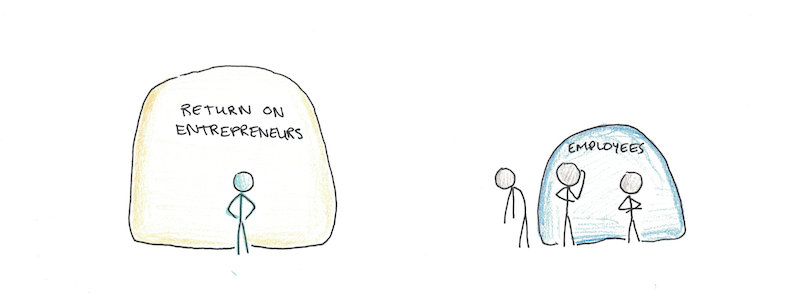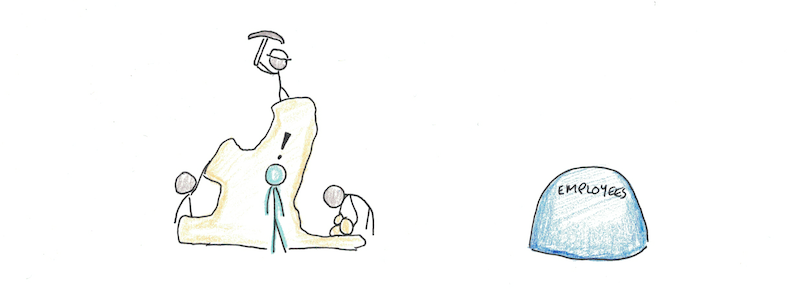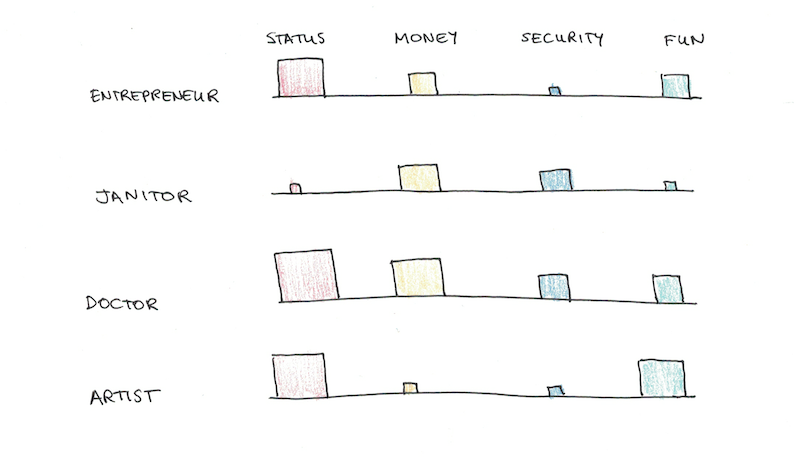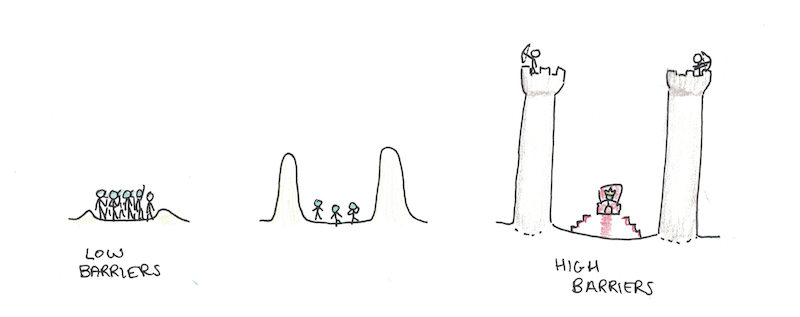I’ve run my own business, first as a sole-proprietor for nine years, then as a corporation for four. I’ve earned a good income in that time. It’s allowed me to take on interesting projects, travel full-time and work whenever I want.
To many outsiders, it looks like I’m living the fantasy you see on so many “earn money from home” scams advertised online.
Despite all this, I absolutely hate the advice that comes with the saying, “You’ll never be rich working for somebody else.”
This is a little phrase that gets thrown around in some corners of the internet, which glorifies entrepreneurship over employment as a means to wealth, freedom and happiness. The implied advice is that working for somebody else is a sucker’s game, and that if you want to really live, you need to start your own business.
Why This Advice is Dumb
This is terrible career advice.
Don’t get me wrong. I love running a business, and I would recommend it to someone who has the right drive to make it work. But the idea that entrepreneurship is the best route to wealth and freedom is stupid.
For starters, the advice doesn’t even make sense. Many of the richest people I know earned all of their money working for other people. Accountants, doctors, engineers, CEOs and financiers. All working for others, all stinking rich.
Second, even if we ignore that the advice is literally false, the assumption—that entrepreneurship offers a better path to wealth than working for others—is bad economics.
Supply and Demand (or Why Get-Rich-Quick Doesn’t Work)
All career choices are pushed by supply and demand, just like any other purchasing decision. If a career choice is really attractive (because it offers a lot of money, for little effort, low talent and is highly prestigious) it will get a lot of new entrants. Those new entrants will increase competition, push the payoff down, and it won’t be so attractive anymore.
Suppose, for a second, that starting a business really did offer a lot more money for less effort and with fewer barriers to entry than working at a job.

What do you suppose would happen?
Obviously, more people would start businesses! Those businesses would compete. Some might succeed, others might fail. The end result would necessarily be that the average payoff to each new entrepreneur would shrink down until it was no longer so lucrative.

Economists call this stable level of profit that you should earn as a business normal profit. It is contrasted with economic profit, the kind of profit you earn when you’re a monopoly or can otherwise prevent people from competing against you.
Even though you might think to yourself, “all that means is I need to make a monopoly!” this reasoning still doesn’t work. Everyone chasing those rare unicorn start-ups also create more competition. Since the prize is bigger if you win, it’s also more fierce before you get there, meaning that the average payoff is reduced.
Why People Don’t Earn the Same Amount
This kind of logic might seem to go too far, however. If it were true—wouldn’t all professions pay the same amount?
However, there’s at least three mediating factors that explain why some people earn more than others, even though we can expect the above reasoning to hold:
1. Some career choices have a higher variance.
Some professions have a very narrow range of possible incomes. Being a public school teacher, for instance. Others have huge ranges, say launching a start-up.

This is a problem with assessing entrepreneurship because it has much greater variance than normal professions. This means you will see some people get really rich. However, what you don’t often see, is a lot of people making zero or negative money (once you count the cost of their time and investments).
A risky-profession might return a little more on average, because people tend to be risk-adverse. But all that means is that people would rather have a decent income as a certainty, rather than a random chance at poverty or riches.
2. Some career choices offer other (non-monetary) benefits.
Some careers are sexy and prestigious. Others have legendary job security and great pensions. Others will guarantee you an impressed look at dinner parties when you tell people what you do for a living.

Money isn’t the only thing people want from a career. Therefore, the more sexy, cushy, prestigious or secure your job is, the more people will want it for a given amount of income. This is why construction workers can often out-earn college instructors, even though the latter is much harder to get—people would rather teach at college than work on a construction site—even if the pay is worse.
3. Some career choices require more talent, connections or credentials.
The final differentiating factor are barriers to entry. Sometimes these take the form of barriers due to ability. A supermodel might be a good job to have, but most people can’t apply. Connections and credentials also form barriers that make it harder for you to succeed.

Medicine is an excellent example of a lucrative profession that remains well-paying, despite being a desirable job for non-monetary reasons and offering relatively secure wealth. It’s hard to get through medical school, and most people are either not smart enough, patient enough or have the means to endure years of training to becoming a doctor.
Once you factor in variance, non-monetary benefits and barriers to entry, you should be able to explain most (if not all) of why some careers pay more than others.
Why This Analysis Doesn’t Look So Good for Entrepreneurship
So let’s take our above analysis and apply it to entrepreneurship. It’s higher variance, certainly. That means some people will win big and others will win nothing (or lose money).
It’s an attractive profession. Most people would love to be their own boss. If anything, this makes entrepreneurship a somewhat worse way to make money (on average).
Finally, the barriers to entry are typically low. Although being able to start a business in some industries really does have high barriers, those are not typically the industries most people consider when making the kinds of stupid statements I’m disagreeing with above.
This analysis seems to hold out fairly well when you consider the evidence.
Entrepreneurs, as a group, do not out-earn their peers. According to a literature review done by the Copenhagen School of Business, self-employed entrepreneurs have “significantly negative” returns, following their choice. Incorporated entrepreneurs show only a slight positive return, even though this career choice requires more ability, connections and capital.
Not Just Entrepreneurs… But All Professions
This type of analysis, however, doesn’t just apply to entrepreneurs, but to every profession.
The risk-adjusted, expected income of any profession, accounting for net non-monetary benefits and barriers to entry, should be roughly equal. There may be temporary exceptions to this, as the labor market takes time to adapt to changes in the overall economy, but these shouldn’t last forever.
Side note: Jobs in tech, like programming, engineering and IT, may be those temporary exceptions, with the explosion in those fields outpacing the ability of people to transition into them. However, there might be a simpler explanation: people either dislike tech enough (non-monetary downside), or lack the ability to succeed in tech (barrier to entry), that benefits will remain high.
If this isn’t true, however, we should expect either the income of the profession to lower over time due to competition, or for more barriers to be erected by those inside the field to preserve the return of the jobs (increasing credentials/licensing required).
This doesn’t mean getting rich is impossible. Effort, acquired skills, connections, credentials and other career assets can all push you into spaces where you are able to enter niches with higher rewards and less competition. But it definitely does dispel the notion that you can get rich simply by avoiding working for someone else.
This also doesn’t mean that the choice of career doesn’t matter. Some careers are naturally harder and more restricting than others. Being a janitor will usually pay less than being an accountant, because there’s only so skillful you can get at cleaning things up that people are willing to pay extra for.
In short, you want to pick a career which matches your level of ability and drive, so that you can achieve your full potential.
You also want to match your career to your values, depending on how much you care about status, money, security and other benefits compared to other people.
Finally, you want to invest as much as you can into building skills, experience, connections and other assets that will allow you to do things others can’t. This is the only stable way to have a successful career. The rest is just luck.
My Own Experience
I love running a business. I think it is challenging, interesting and can be a great career path. However, I definitely don’t feel like it’s the easiest possible way to make a lot of money.
I feel like I have made a decent living, and one that has reached a semi-stable state (although still with a lot more variance than most employees would experience). Getting to this stage, however, is no different than working in any other demanding field. I had to put in enormous amounts of upfront work to build career assets first.
If you, also, feel like you’d like to take on a career that’s quite challenging, requires an enormous amount of effort and involves more variance than a typical profession, entrepreneurship might be right for you. If you think it’s an easy way to make a lot of money without working hard, someone’s been fooling you.


 I'm a Wall Street Journal bestselling author, podcast host, computer programmer and an avid reader. Since 2006, I've published weekly essays on this website to help people like you learn and think better. My work has been featured in The New York Times, BBC, TEDx, Pocket, Business Insider and more. I don't promise I have all the answers, just a place to start.
I'm a Wall Street Journal bestselling author, podcast host, computer programmer and an avid reader. Since 2006, I've published weekly essays on this website to help people like you learn and think better. My work has been featured in The New York Times, BBC, TEDx, Pocket, Business Insider and more. I don't promise I have all the answers, just a place to start.